What Is Considered Blocking a Driveway or Sidewalk?
Author: Rick Worst | Editor: Omar Alonso
Review & Research: Jen Worst & Chris Miller
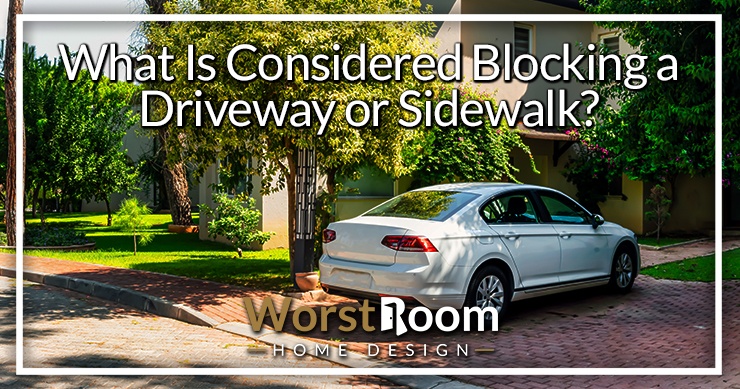
Has your neighbor accused you of blocking their driveway? Are they just acting like a jerk, or do they have a point? What is considered blocking a driveway anyway? As a short answer, blocking a driveway means the person living on the property can't access the driveway from the road or they can't get out of their driveway into the street. But there's also more to it than that, legally.
If you're preventing a vehicle from getting in or out of the driveway, you're blocking it, even if you haven't damaged their car, truck, or motorbike. Simply parking too close to the driveway will be considered blocking it. The repercussions for making this mistake intentionally or accidentally are severe. You could end up with the cops towing your vehicle away, or you might get an expensive ticket.
This post unpacks everything you need to know about the rules surrounding blocking a person's driveway. We'll also discuss what "nuisance parking" means, whether parking on the sidewalk is legal, and what actions you can take if someone's blocking your driveway.
What Is Considered Blocking a Driveway?
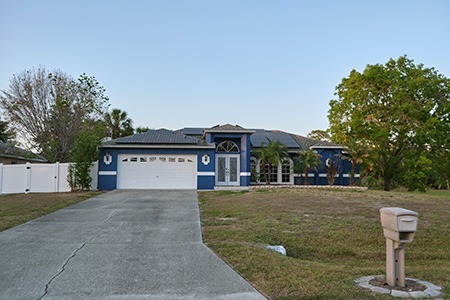
Blocking someone's driveway isn't very neighborly. It's inconsiderate, and you'll probably have them protest it. You might not know that blocking a driveway is considered trespassing in the eyes of the authorities, and it's an illegal act in most cities across the United States.
Any excuses are null and void. It doesn't matter the type of driveway. It doesn't matter if it's made out of dirt and gravel and is 2 miles long. It doesn't matter if you're having a party and can't fit everyone in your driveway or in the street in front of your house. It doesn't matter if you think that their driveway is too close to your property line. Get these notions out of your head.
If you experience this problem frequently happening to your driveway, you can erect a "No Parking" sign somewhere on your property where it's visible to people that might block your driveway. However, you can't post the sign outside your property boundaries, such as on the sidewalk, or violate city bylaws.
If you know your neighbors and have a good relationship with them, you can politely ask them if you can park outside their property. If you don't know them, taking this action could upset them, leading to a confrontation that might turn verbally abusive or even violent when you return to your vehicle.
If you're parking on the street in a neighborhood you don't know, check to see you're not unknowingly obstructing a hidden driveway. If your household has several vehicles, try to park as many on the property as possible or out of the way if you must park on the street.
Unless it's an emergency, you don't have the right to park in front of someone's driveway. However, if that's the case, you'll need to prove it's an emergency to the property owner.
Can You Legally Prevent Someone From Parking Outside Your Home?
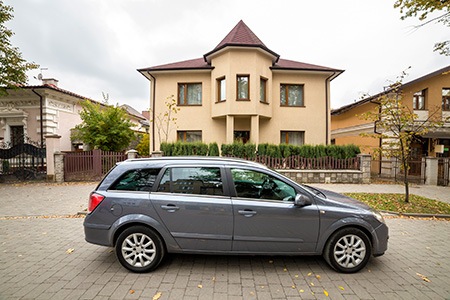
Unfortunately, if someone makes the mistake of parking in front of your house in the street, there's not much you can do about it, regardless of your state. It's legal to park in the street.
If you don't have a driveway and you have a "spot" where you like to park in front of your house, you don't have any legal claim over that parking bay or designated area, and you can't stop other motorists from parking there.
However, this rule might only apply to some properties in some neighborhoods around America. If someone temporarily blocks your driveway for less than 72 hours, the police won't likely do anything about it if you call them.
Whatever you do, don't approach the offender with a bad attitude. You'll likely offend them, and they'll probably leave their car there to spite you. You can't damage the person's vehicle or start a fight with them. Doing so might lead to the police arresting you for malicious damage to property or assault.
In this case, the best action is politely to ask them to move their vehicle. If they don't comply or turn nasty, take a photo or video of the car, and show how it's blocking your property. Make sure you know what is considered blocking a driveway first before you stir up a problem. Go back to your home and call the police with the information.
Nuisance Parking Explained
If someone parks on your private property without permission, it qualifies as nuisance parking. If a property has a fence around it or a visible "no parking" sign, it's likely private property, and no one can park there other than the owner.
According to bylaws in the United States, if a vehicle is parked in front of your driveway or breaks down on your property, the owner has 48 hours to remove it before it is considered abandoned or unattended.
Can the Police Tow a Car That's Blocking a Driveway?
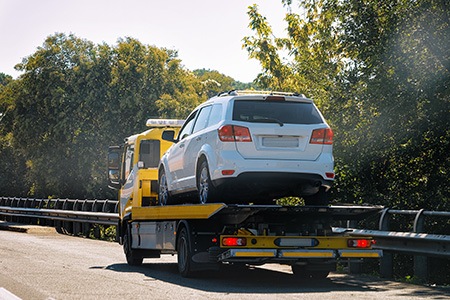
It's illegal to block someone's driveway in states like California, Indiana, and Florida, but not every state has this law. Other states are more restrictive than others when it comes to what is considered blocking a driveway.
For instance, parking within five feet of a driveway opening in the States of Washington, Colorado, and Tennesse is illegal. So basically, you need to leave at least the dimensions of a parking space between your car and someone’s driveway.
Blocking someone's driveway is a civil matter; you can report it to law enforcement authorities. The police can take the necessary action of ticketing a car blocking a driveway. However, before you call the cops and escalate the situation, try talking to the responsible person.
The police might not respond to a call out for someone blocking your driveway, especially in counties like Los Angeles, California. LA County recently revised its list of violations that warrant a call out to save on allocating police resources to problems they don't view as life-threatening. The same might apply to many other states and counties across America.
However, in some states with lower crime rates, the police suggest you call a tow truck service to remove the vehicle, or the police might arrive on the scene and ticket the driver.
Is Blocking the Sidewalk With Your Car Illegal?
Even if it cuts through your driveway, a sidewalk is a public domain. Therefore, parking your car in your driveway and leaving a section of it hanging into the sidewalk is illegal, blocking the thoroughfare. If your vehicle is preventing people like cyclists or pedestrians from accessing the sidewalk, you're technically committing an offense.
Why You Should Avoid Blocking the Sidewalk

Like blocking a driveway, the consequences of blocking a sidewalk can result in the police issuing you a ticket or arranging for a tow of your vehicle. If a cyclist isn't paying attention to their surroundings and rides into the back of your car, causing an accident that injures them, you might be held legally responsible for their injuries and damage to their bike.
Like the example of blocking a driveway, most police services throughout the United States won't bother responding to people complaining about your vehicle blocking the driveway.
However, your neighbor has a right to complain to you if they feel your vehicle is causing problems, such as preventing their young children from riding their bikes up and down the sidewalk or moms from pushing a stroller past your driveway on the sidewalk.
Can I Turn My Car Around in Someone Else's Driveway?
All of us have turned our cars around in someone else's driveway at some point during our time behind the wheel. However, is it legal to do so, or can you get in trouble for this action? While you might think it's no big deal, the reality is that it's not always okay to do it.
Some homeowners might not have a problem with you entering their driveway to turn your vehicle around, but others might find it offensive. Some people have a huge problem with anybody setting foot, or tires in this case, on their property.
In some cases, you may create an issue with the property owner if you use their driveway to turn around. For instance, they might have laid a new concrete slab at the entrance, and by entering the driveway unaware that the concrete is still curing, you leave tire tracks on the freshly prepared surface.
If that's the case, the property owner might see you, take your license plate number, and report you to the police for damage to their property. Or they might hire an attorney to chase you for the repair costs in court. Your innocent action could end up costing you severely in this instance.
So, before you randomly enter someone's driveway to turn around, consider the potential of what could happen if you're not paying attention to your surroundings. Even if you don't live in the area, be respectful of other people's property and treat it the way you would want them to treat yours.
Key Takeaways Regarding Blocked Driveways
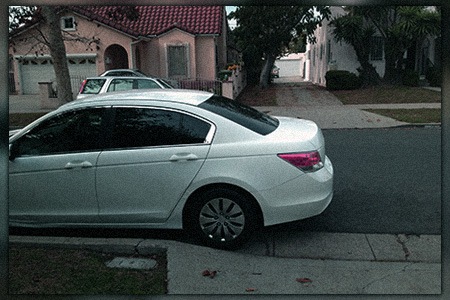
Let's recap the main points we've learned from above regarding what is considered blocking a driveway to really embed it in our memories:
- Parking in front of someone's driveway is illegal. However, the offending party has 48 hours to remove the vehicle from the area.
- You can do nothing to stop them, so don't approach them in anger; politely ask them to move instead.
- If the person doesn't comply with your request, inform the police.
- If the vehicle is still outside your driveway after 48 hours, call the police again.
- If the cops don't want to come out, they'll recommend you can get a towing service to remove the vehicle.
- Some states have more stringent rules on parking in front of someone's driveway.
- Parking in your driveway and blocking the sidewalk is also against local bylaws.
- Parking on private property without the owner's permission is illegal.
- If you have to turn around in someone's driveway, pay attention to your surroundings so as not to damage their property.
Basically, if it's not your property or your driveway, then don't park in it or block the entrance into it. Leave at least another car length between your car and the driveway entrance. And remember, you never own a sidewalk.
That is What is Considered Blocking a Driveway
You're likely not here trying to figure out what you can get away with. You're annoyed that someone else is infringing on your private property. Unfortunately, we don't own the public street or sidewalk, but you do have rights in terms of how close someone can park to your driveway entrance.
It will change based on your state but 5 feet is a safe bet. So what is considered blocking a driveway? Parking within 5 feet of another person's driveway entrance will be considered blocking it.



